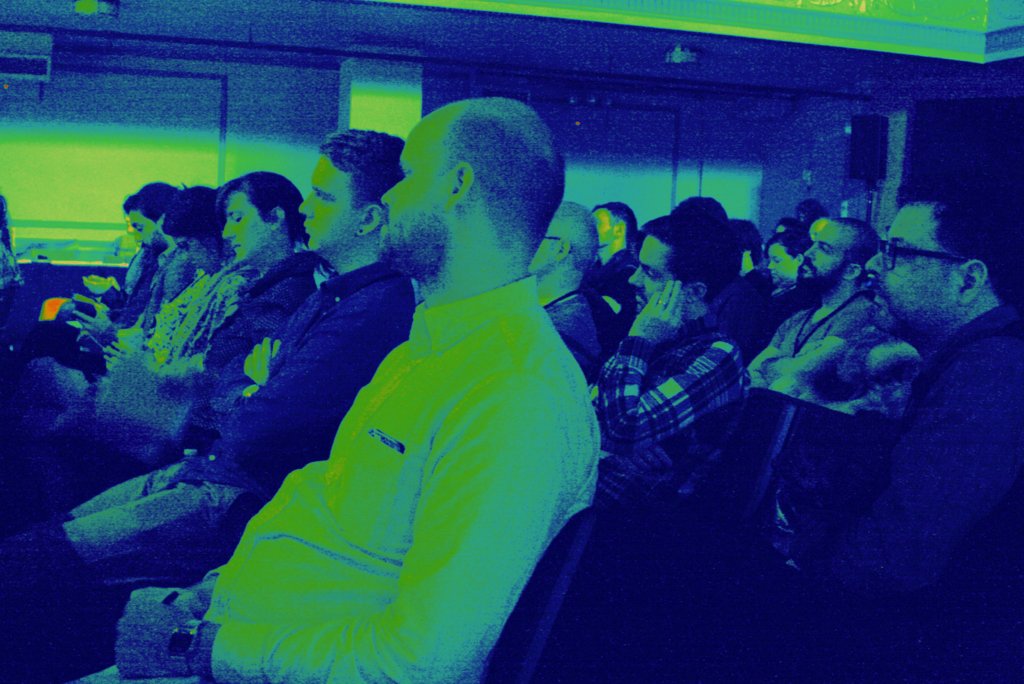You can have a big industry name to draw attendees to your event. But it can take extra preparation to make sure the conversations that happen there bring the attendees back to the future. Gaming conference TWO5SIX, run by Dumbo’s Kill Screen, a news resource that wants to elevate the level of discourse around video games, seemed to make that a priority.
The conference took place on Friday, May 16, at Roulette Intermedium in Downtown Brooklyn. Its organizers thoroughly prepped each of its sessions in advance — that was clear. Most sessions were set up as a conversation between Kill Screen’s founder Jamin Warren and one prominent person from video games and another prominent person in a similar field with similar skills.
They felt like loose conversations, but Warren had a set of questions ready to go and slides prepped to run behind his interlocutors to illustrate some of the topics they had ready to talk about. So the day was full of interesting discussion points.
Some photos from the event:
[slideshow_deploy id=’16999′]
Here are just a small handful of highlights:
- Podcasting. Johanna Zorn, founder of the Third Coast International Audio Festival, called the advent of podcasting the third golden age of radio. She cited the growth of podcasting networks that help the shows scale and share audiences. She also cited creators with a lack of radio background as an asset to the scene, “Some of it emanates with people with a background in radio and some of it totally not,” she said.
- Audio needs sound design. Patrick Balthrop, founder of Interactive Sound and Fury and sound designer on the BioShock games said, “Everyone comes to a sound and they hear it in the context of everything else they have ever heard in their entire life. They aren’t aware of that, but it’s my job to be aware of that.”
- Games yield real emotions. Both Affectiva founder Rana el Kaliouby and Telltale Games CTO Kevin Bruner had a lot to say about the kind of emoting people do while playing video games. There are lots of videos online of players overwhelmed with emotion at the end of Telltale’s Walking Dead game. Bruner said (partly as a joke), “I think there are a lot of ways a computer can make you cry.” Kaliouby has founded her business on reading people’s emotions from facial expressions.
- Grown-up themes in games. Usually when someone talks about “adult themes” in games, they mean sex. Tamas Kemenczy presented on his game, Kentucky Route Zero, which dealt with other adult topics, such as debt and alcohol.
- ICYMI: Dwarf Fortress.
- Players will surprise game makers. Steve Gaynor cofounded The Fullbright Company, which made the game Gone Home. In the game, every single object can be picked up and moved around. They didn’t expect some players to pile every single object up in one room or, even more interestingly, to make careful, artistic installations of particular objects that had more meaning together.
- Ways to stretch an entrepreneurial dollar. The team behind Gone Home rented one house and they all lived and worked in it together while they built the game.
- Nintendo was ahead of its time. Kids of the ’80s will remember the trippy commercials for Nintendo’s Power Glove, but even Hollywood couldn’t make the device fly. Wearables expert for Adafruit, Becky Stern, said it was simply ahead of its time. She has one a roommate hacked with Arduino so it works again.
- Big data and Sesame Street. Miles Ludwig said that Sesame Street’s model for delighting users has always been to hire talented people and let them go. Now, Big Bird and friends will start plumbing user data to make more fun, educational products (fine, bring all the Hadoop you want, but you can’t top this). By the way, the company is also teaming up with Brooklyn’s MakerBot.
- Mindbender. Jake Barton of Local Projects said, “Playgrounds are just machines for experiencing Newtonian forces on your body.” Drop that one the next time you run out of things to say to another parent while your kids are on a play date.
- The pressure of realism. Aleissia Laidacker has worked on two versions of Assassin’s Creed, of which running any direction you want is a hallmark of the game. She said, “The challenge of video games is to not just move from one point to another but to look like something as it does it.”
- Unity has leveled gamemaking. Mike Woods was part of the team behind some of the most recognized CGI creatures in the world, including the Coca-Cola Polar Bears. Now, he’s deep in gaming engines, but he might never have even tried if not for Unity. “Unity is just incredibly easy,” he said. Since then, they have got to try lots of engines and now his company, Framestore, is starting to consider making an engine of their own.
We got a chance to chat with the speakers on the 100 percent Brooklyn panel, Kaho Abe and Becky Stern, who discussed wearable technology together. It turns out that the event was a reunion of sorts for the two women, as they both overlapped a bit at Parsons School of Design.
Stern, who designs wearable projects from Adafruit creations, expressed appreciation for Abe’s grassroots education work.
“It’s useful to see people use our hardware in the classroom setting,” she said.
Abe had a maker’s take on Brooklyn’s tech moment: “My world overlaps with games and design and technology. There’s a lot of artists here and they work with their hands. Not a lot of places have all that overlap,” she said.
Abe is the artist-in-resident at the Game Innovation Lab, which we visited recently.







